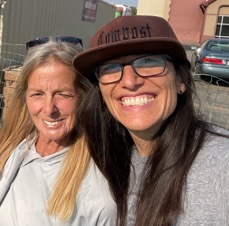This post originally appeared here.
The National Science Foundation has awarded a Stage 1 Planning Grant to a project led by the College of Health’s Shannon Jones, assistant clinical professor in the Department of Nutrition and Integrative Physiology. The six-month planning project brings together the expertise of people experiencing homelessness, as well as civic and academic collaborators, to plan a community-designed resource hub to address food access and security for people experiencing housing insecurity and homelessness.
A Stage 1 Grant pays for Jones’ group to research, design and implement the pilot project, the Intersectional Food Access Rights for Marginalized Communities (IFARM) Hub. It’s a hybrid farm and civic engagement center for underserved communities, to be located at the Wasatch Community Gardens’ Green Phoenix Farm in Salt Lake City.
“The project is community designed: we’re going out and working with folks who are food insecure and housing insecure to find the gaps in the resources and how those would be met,” Jones said. “We’re getting our research team together, then our advisory board, to plan what this farm hub would look like. Then we’ll put this plan into a bigger proposal for Stage 2 funding.”

PHOTO CREDIT: College of Health
Lynnette Burn (left) and Shannon Jones.
Download Full-Res ImageJones is the team’s principal investigator, and is also the director of the University of Utah Center for Community Nutrition. Her co-investigators include Lynette Burn, a team lead for the Green Phoenix Farm and the leader of The Road Home Palmer Court’s Wellness Garden. James Loomis, another co-investigator, is a regenerative agricultural farmer who co-designed and oversees the Green Phoenix Farm. Sarah Strang is the Deputy Director of Crisis Services for The Road Home, and is an adjunct instructor in the University’s College of Social Work.
And the team involves two other co-investigators from the University of Utah: Jeff Rose, associate professor in the Department of Parks, Recreation and Tourism, and Sarah Canham, associate professor in the College of Social Work. Jones had previously worked with Rose and Canham on another study funded by the National Institute for Transportation and Communities.
“When you find folks you really want to work with, you stick with it,” Jones said. “Jeff does a lot of work with the unsheltered and has a good lay of the land in terms of where folks are living. Their needs are falling through the cracks.”

PHOTO CREDIT: College of Health
University students working the Palmer Court Wellness Garden.
Download Full-Res ImagePeople experiencing homelessness (PEH) face disproportionately high rates of chronic diet-related disease, food insecurity, hunger and malnutrition. The project will work with PEH to identify the needs to improve access to both food and housing. And the result, the IFARM Hub, will aggregate food, housing, health, transportation and technology services to increase and improve access to basic resources.
“As researchers and interventionists, we’re making sure the needs of PEH are being met,” Jones said. “We’re letting them self-define what their needs are, so we conduct the research along with them, not on them.”
To achieve that aim, Jones’ team will work with a Project Advisory Board comprised of PEH who will be compensated for their time. By the end of Stage 1, the project will be ready to pilot, and the team will apply for a Stage 2 grant to fund the implementation of IFARM and disseminate findings so this model can be replicated throughout the U.S.
“We want to build community and create programming that is self-sustainable and economically viable,” Jones said. “For example, community members can get access to healthy food but also contribute to growing it. It doesn’t feel like they’re getting charity—they’re part of this community that’s working together to meet their own needs.”
